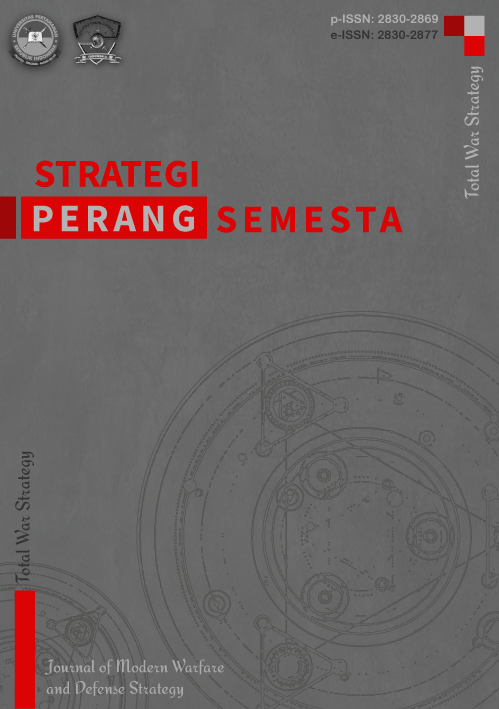Strengthening the state defense and building an attitude of nationalism by implementing the universe war strategy in the era of globalization
DOI:
https://doi.org/10.56555/sps.v8i2.1525Abstract
Defending the State in a broad sense is not only in dealing with the military but also non-military threats. In the era of globalization and the rapid progress of science and technology, the forms of threats are very varied and complex; only nations that have competitive advantages can compete and win this competition. So that this research is intended to find out more about how defending the country awakens an attitude of nationalism, and the Universal War Strategy can be implemented in dealing with one form of war in the globalization era. The method used in this study is to use a phenomenological qualitative descriptive method, where the researcher will apply and apply his subjectivity and interpersonal skills in the process of exploratory research. The researchers assess that there is a correlation between state defense and nationalism with the implementation of a universal war strategy with efforts to deal with the war in the era of globalization, which must be spelled out more specifically in terms of the application of universality to improve the character of the nation, especially the younger generation to increase further their sense of nationalism towards the State of Indonesia because they are candidates for continuing the nation's struggle and development in the future.
References
A Subagyo. (2015), Bela Negara Peluang Dan Tantangan Di Era Globalisasi (Yogyakarta: Graha Ilmu).
Abdullah, I. (2006). Konstruksi dan Reproduksi Kebudayaan.(Yogyakarta: Pustaka Pelajar). Hlm.17
Afi, K. E. (2022). Pendidikan Karakter di Era Globalisasi pada Jemaat Gmit Ebenhaezer Matani. EDUKATIF: JURNAL ILMU PENDIDIKAN, 4(2), 2931-2940.
Aniek Irawatie, Iswahyuni Iswahyuni, and Marina Eri Setyawati (2019), “Education Learning Development of Character Education-Based State Defense,” International Journal of Multicultural and Multireligious Understanding 6, no. 2: 27–42.
Arianto. (2015). “Menuju Persahabatan” Melalui Komunikasi Antar Pribadi Mahasiswa Beda Etnis. Jurnal Sosial Ilmu Politik Universitas Hasanuddin.
Budi Susilo Soepandji,(2012). BANGGA INDONESIA: Menjadi Komponen Cadangan Tanah Air (Jakarta : Gramedia Widiasarana Indonesia (Grasindo) : Cetakan III, hlm. 34
Helaluddin. (2018). Mengenal Lebih Dekat dengan Pendekatan Fenomenologi: Sebuah. Penelitian Kualitatif. UIN Sultasn Maulana Hasanuddin Banten, 1-16.
Kementerian Pertahanan RI (2014), Tataran Dasar Bela Negara, (Jakarta, Ditjen Pothan Kemhan RI) , hlm. 38-39.
LAW OF THE REPUBLIC OF INDONESIA NUMBER 20 OF 2003 CONCERNING THE NATIONAL EDUCATION SYSTEM
LAW OF THE REPUBLIC OF INDONESIA NUMBER 3 OF 2002 CONCERNING STATE DEFENSE
M.T. Hirnissa, Muzafar Shah Habibullah, and A.H. Baharom (2009), “The Relationship between Defense, Education and Health Expenditures in Selected Asian Countries,” International Journal of Economics and Finance 1, no. 2: 149–155.
Muharom Rusdiana. (2022), “AKSI BELA NEGARA MENURUT AJARAN ISLAM DI MASA PANDEMI COVID 19 (State Defense Action According to Islamic Teaching in the Covid Pandemic 19),” SSRN Electronic Journal 19.
Murti, H., & Toruan, T. (2022). PEMBINAAN KESADARAN BELA NEGARA DALAM MENDUKUNG PERTAHANAN NEGARA. Strategi Perang Semesta, 6(2), 153-178.
Pertahanan, K. (2015). Buku putih pertahanan Indonesia. Jakarta: Kementerian Pertahanan Republik Indonesia.
Prabowo, J.S. (2019). Pokok-pokok Pemikiran tentang Perang Semesta (Ketiga). Pusat Pengkajian dan Strategi Nasional.
Rangkuti. (2016), Pendidikan Pancasila Dan Kewarganegaraan Membangun Kesadaran Bela Negara, Bogor: IPB Press.
Soekanto Soerjono. (1984). Pengantar Penelitian Hukum. Cet ke-3. UI Press. Jakarta.
Suwarno Widodo. (2011), “Implementasi Bela Negara Untuk Mewujudkan Nasionalisme,” Jurnal Ilmiah Civis I, no. 1: 18–31.
The 1945 Constitution of the Republic of Indonesia
Downloads
Published
Issue
Section
License
Proposed Policy for Journals That Offer Open Access. Authors who publish with this journal agree to the following terms:
- Authors retain copyright and grant the journal right of first publication with the work simultaneously licensed under a Creative Commons Attribution License that allows others to share the work with an acknowledgment of the work's authorship and initial publication in this journal.
- Authors are able to enter into separate, additional contractual arrangements for the non-exclusive distribution of the journal's published version of the work (e.g., post it to an institutional repository or publish it in a book), with an acknowledgment of its initial publication in this journal.
- Authors are permitted and encouraged to post their work online (e.g., in institutional repositories or on their website) prior to and during the submission process, as it can lead to productive exchanges, as well as earlier and greater citation of published work (See The Effect of Open Access).
Proposed Policy for Journals That Offer Delayed Open Access. Authors who publish with this journal agree to the following terms:
- Authors retain copyright and grant the journal right of first publication, with the work [SPECIFY PERIOD OF TIME] after publication simultaneously licensed under a Creative Commons Attribution License that allows others to share the work with an acknowledgment of the work's authorship and initial publication in this journal.
- Authors are able to enter into separate, additional contractual arrangements for the non-exclusive distribution of the journal's published version of the work (e.g., post it to an institutional repository or publish it in a book), with an acknowledgment of its initial publication in this journal.

